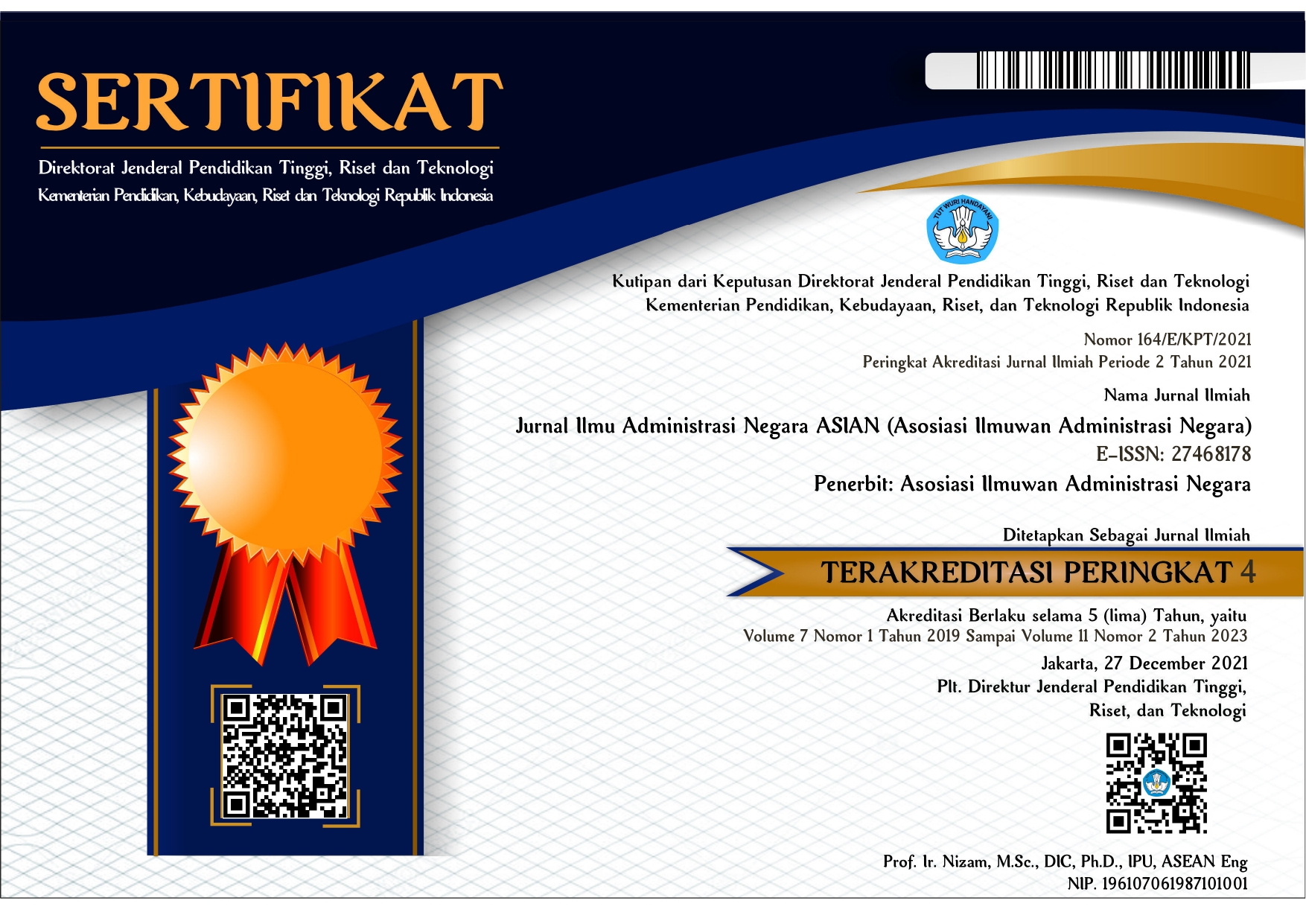Kolusi Pintu Awal Korupsi
Perlu Pendekatan Etika Administrasi Dan Norma Hukum
 Abstract views: 866
,
Abstract views: 866
,
 PDF downloads: 1373
PDF downloads: 1373
Abstract
Corruption prevention should be done earlier starting from its entrance, collusion. Collusion so far belongs to the classification of ethical violation but touches inadequately the violation of legal norm, because collusion practice can be done during the occupation process. It is this that gives the actor of collusion an opportunity of using the aspects that are not touched by the existing norms of law. This research used qualitative analysis method through observation, interview, and literature review. The result of research shows that corruption by means of collusion is categorized into ethical violation only. Collusion case is conducted in the process of electing the officials, before the election of legislative members or regional leaders. Intersection occurs between prospect public official and capital power.
Downloads
References
Buku:
Badjuri, Achmad. 2011. Peranan Komisi Pemberantasan Korupsi (KPK) Sebagai Lembaga Anti Korupsi di Indonesia. Jurnal Bisnis dan Ekonomi (JBE). 18 (1) : 84-96.
Buku Panduan DosenPembelajaran Pendidikan Anti Korupsi untuk Perguruan Tinggi, 2016, Biro Kerjasama dan Komunikasi Publik, Komeristek DIKTI, Jakarta.
Denhardt, Janet V.& R.B.Denhardt, 2003 The New Public Serving not Steering Amonk New York, M.E. Sharpe
Giddens, A, 1986, Kapitalisme dan Teori Sosial Modern (Terjemahan 1 , V1 Press, Jakarta)
Handoyo Eko. 2009. Pendidikan Anti Korupsi. Semarang: Widyakarya Press.
Hunt, Alan, 1978. The sociological Movement In Law, Billing and Son Ltd, Worcester&London.
Kumorotomo, w, 2008,Akuntabilitas Birokrasi Publik, Pustaka Pelajar, Yogyakarta. [10]Kurniawan, Teguh. 2009. Peranan Akuntabilitas Publik dan Partisipasi Masyarakat dalam Pemberantasan Korupsi di Pemerintahan. Bisnis&Birokrasi, Jurnal Ilmu Administrasi dan Organisasi.
Paramitha 1992, Etika Administrasi Negara, Rajagratindo Persada, Jakarta.
Quah, Jon ST, 1982, Korupsi Birokrasi : Pengalaman Lima Negara ASEAN. Company Lexington, massachusetts, Toronto.
Prof. Dr. Andi Hmazah, SH, 1982, Delik-delik Tersebar diluar KUHP, Penerbit Pradnya.
Susilo (editor), “Praktek Suap”, Ensiklopedia Dunia (Jakarta: Dunia Aksara, t.th., 120)
Jurnal:
Bedner, Adriaan. 2010. “An Elementary Approach to the Rule of Law”, Hague Journal on Rule of Law, 2: 48-74, 2010.
Lubis, Todung Mulya. 2015. Indek Prestasi Korupsi Indonesia. Bahan Presentasi. Jakarta : Tranparency International Indonesia.
Neneng Siti Maryam, Jurnal Ilmu Politik dan Komunikasi Vol V1 No. 1/Juni 2016
Thontowi Jawahir, “Prospek Pemberantas Korupsi: Perimbangan Kewenangan KPK dengan Institusi Penegak Hukum”, Jurnal Pemerintahan. Jilid 1 No 2 Tahun 2008. Yogyakarta: Fisipol UMY.
Undang-Undang
Undang-undang Nomor 3 Tahun 1971 tentang Pemberantas Tindak Pidana Korupsi. [19]Rasul, Sjahruddin. Penerapan Good Governance di Indonesia dalam upaya Tindak Pidana Korupsi. Mimbar Hukum. 21 (3) : 409-628.
Sulistyowati, Reformasi Hukum Untuk Siapa, Kompas, 9 Oktober 2019
Surat kabar:
Tribun Jabar, 2016. Jabar Provinsi Paling Korup, Ini nama-nama Kepala Daerah di Jawa Barat yang terjerat Korupsi http://jabar.tribunnews.com/-2018/04/18/jabar-provinsi-paling-korup-ini-nama-nama-kepala-daerah-di-jawa-jawa-barat-yang-terjerat-korupsi?page=all Kompas, 19 Maret 2021. Hal 1
Copyright (c) 2022 Jurnal Ilmu Administrasi Negara ASIAN (Asosiasi Ilmuwan Administrasi Negara)

This work is licensed under a Creative Commons Attribution-ShareAlike 4.0 International License.
Authors who publish with this journal agree to the following terms:
1. Copyright on any article is retained by the author(s).
2. The author grants the journal, right of first publication with the work simultaneously licensed under a Creative Commons Attribution License that allows others to share the work with an acknowledgment of the work’s authorship and initial publication in this journal.
3. Authors are able to enter into separate, additional contractual arrangements for the non-exclusive distribution of the journal’s published version of the work (e.g., post it to an institutional repository or publish it in a book), with an acknowledgment of its initial publication in this journal.
4. Authors are permitted and encouraged to post their work online (e.g., in institutional repositories or on their website) prior to and during the submission process, as it can lead to productive exchanges, as well as earlier and greater citation of published work.
5. The article and any associated published material is distributed under the Creative Commons Attribution-ShareAlike 4.0 International License








